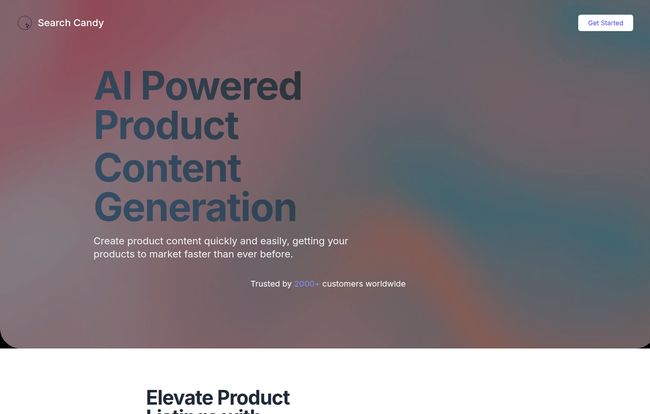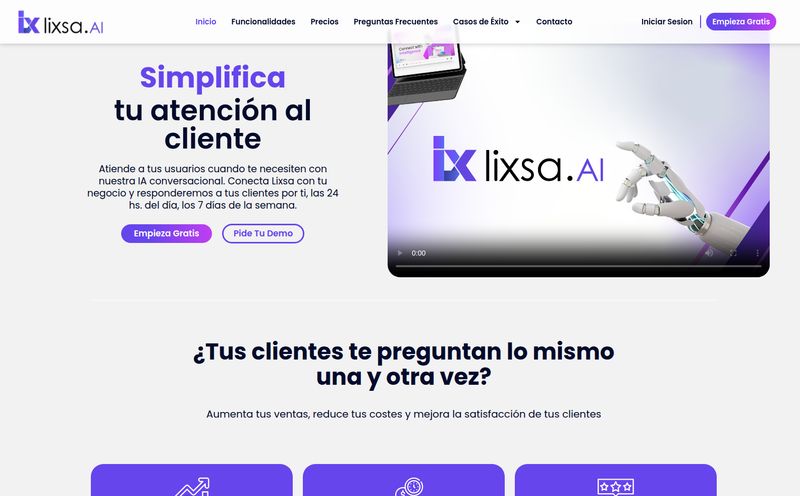If you've ever worked in e-commerce, you know the grind. It's not the glamour of ad campaigns or the thrill of a conversion spike. No, it's the soul-crushing, mind-numbing task of writing product descriptions. Especially when you have hundreds, or even thousands, of SKUs. I once had a client with over 5,000 SKUs for industrial bolts. Bolts! Try writing 5,000 unique, compelling, and SEO-optimized descriptions for bolts. It’s enough to make you question your life choices.
So, when a tool like Search Candy lands on my radar, claiming to use AI for product content generation, my ears perk up. Part of me is skeptical—we've all seen the robotic, keyword-stuffed nonsense some AI writers spit out. But another part, the part that remembers those bolts, is genuinely hopeful. Could this actually work? I decided to take a look.

Visit Search Candy
So, What's the Big Deal with Search Candy?
First off, Search Candy isn't just another generic AI writer you feed a prompt to. It positions itself as a conversational AI platform built specifically for the chaos of e-commerce. The whole idea is to speed up the process of getting products live on your site, but with content that doesn't suck. Content that people actually want to read and, more importantly, that Google wants to rank.
It’s designed to be an integrated solution. Think of it less as a separate tool and more like an extension of your own marketing team—a very, very fast junior copywriter who never needs a coffee break. It’s built to help you create powerful, search-optimized listings across your entire product catalog, which for a sprawling ecomerce site, is a pretty tall order.
The Features That Actually Matter
Any platform can throw a bunch of features on a landing page. I'm more interested in what's actually useful for someone trying to drive traffic and make sales. Here’s what stood out to me.
AI-Powered Content Generation (Obviously)
This is the main event. You can feed it your product data and it generates descriptions, titles, and other bits of content. The promise is speed. Instead of taking weeks to roll out a new product line, you could potentially get it done in days or even hours. It's like having an assembly line for your product pages, moving them from 'data in a spreadsheet' to 'live on the site' with incredible efficiency.
The Content Optimizer is the Real Kicker
Here's what got me really interested. Search Candy has a Content Optimizer tool. This is what separates it from just being a fancy version of ChatGPT. It claims to analyze your existing content, identify gaps, and sniff out SEO opportunities. In my world, that’s gold. It's one thing to create content; it's another thing entirely to create content with intent.
This tool is about using data to refine what you have. It helps you find those long-tail keywords you might be missing or shows you where your competition is eating your lunch. It’s about moving from just filling a blank space to strategically targeting search queries that bring in qualified traffic. That's a huge step up from simple generation.
Customization and Developer-Friendly APIs
I was also happy to see that it’s not a completely closed box. You can customize fields to fit your specific product needs, which is critical. Every store is different. The data points for a t-shirt (material, fit, color) are completely different from a piece of software (system requirements, version). The platform also has developer-friendly APIs, meaning bigger teams with custom-built backends or complex PIM (Product Information Management) systems can integrate it directly into their workflow. That shows they're thinking about businesses that operate at scale.
My Honest Take: The Good and The Room for Improvement
Alright, no tool is perfect. Let's get into the nitty-gritty. Based on some of the data I've seen, Search Candy is a powerful assistant, but it’s not quite ready to take over the world. And honestly? I find that reassuring.
The biggest benefit is the massive time savings. The ability to generate a solid first draft for thousands of products is, without a doubt, a game-changer. It takes the most tedious part of the job off your plate. The data-driven insights from the optimizer also give you a tangible edge over just guessing what keywords to use. This combination can directly lead to better search visibility and, hopefully, more sales.
However, let's talk about the reality of the output. The platform's own metrics sometimes show an SEO score that isn't a perfect 100, or content quality that hovers around 75%. What does this mean in practice? It means you shouldn’t expect to just press a button and have flawless, brand-perfect copy ready to publish. I see Search Candy as an incredibly powerful 'First Draft Generator.' It gets you 75-80% of the way there, and then a human editor or SEO specialist should come in to add that final 20-25% of polish, brand voice, and strategic nuance.
For example, the AI might not instinctively grasp your brand’s quirky sense of humor or know to highlight sustainability features, which are huge selling points right now. It might not pick up on seasonal trends unless you guide it. That final layer of human strategy is still essential. But let's be clear: getting you 75% of the way there is still a monumental leap forward from starting with a blinking cursor on a blank page.
What's the Damage? A Look at Pricing
This is often the make-or-break question. Search Candy uses a Custom Pricing model. Before you groan, hear me out. In my experience, for a B2B tool like this, it's often a good thing. A fixed price for a tool meant to serve both a tiny startup and a massive enterprise is never right; it either prices out the little guy or leaves money on the table from the big corporation.
Their model, designed for "early startups to Companies at scale," means they'll likely work with you to figure out a plan that fits your needs and budget. You'll have to reach out to them for a quote, but this approach suggests a focus on partnership rather than just a transaction. It’s about finding a fit, not just making a sale.
The Final Verdict: Who Is This For?
So, should you drop everything and sign up for Search Candy? It depends.
If you're an e-commerce manager at a company with a huge and ever-changing product catalog, absolutely. This tool could be your new best friend, saving you and your team hundreds of hours. If you're a startup trying to get to market fast on a lean budget, this could give you the content firepower of a much larger team.
On the other hand, if you're an artisan selling 15 unique, handcrafted items on Etsy, this is probably overkill. The power of your brand is in your personal story and touch, and you should probably write those descriptions yourself.
At the end of the day, Search Candy is a powerful ally in the fight against tedious content creation. It's not a magic wand that replaces human marketers. Instead, it’s a force multiplier. It automates the 80% of the work that's repetitive and time-consuming, freeing up human experts to focus on the 20% that requires real strategy, creativity, and brand understanding. And in my book, that's a pretty sweet deal.
Frequently Asked Questions
- 1. What is Search Candy in simple terms?
- Search Candy is an AI-powered software designed for online stores. It helps them quickly create and optimize product descriptions and other content to show up better in search results and increase sales.
- 2. How does Search Candy actually help with SEO?
- It helps in a few ways. It generates unique content at scale, avoiding duplicate content issues. Its Content Optimizer tool also analyzes your pages to find keyword gaps and other opportunities to improve your rankings on search engines like Google.
- 3. Is the content created by Search Candy completely unique?
- Yes, AI generation tools like Search Candy are designed to create original content based on the data you provide. However, it's always a best practice to have a human review the content to ensure it perfectly matches your brand's voice and tone.
- 4. Is Search Candy easy to use for someone who isn't very technical?
- The platform is designed to be user-friendly for business users, but it also includes developer-friendly APIs for more technical integrations. For basic content generation and optimization, it should be quite straightforward for a marketing or e-commerce manager.
- 5. What kind of businesses get the most out of Search Candy?
- Businesses with large product catalogs (hundreds or thousands of SKUs) will see the biggest return on investment due to the immense time savings. Startups looking to launch quickly and marketing agencies managing multiple e-commerce clients are also ideal users.
- 6. How does Search Candy's pricing work?
- Search Candy uses a custom pricing model. This means you need to contact their sales team for a quote based on your specific needs, such as the size of your catalog and the features you require. This allows them to create a plan that fits businesses of all sizes.



